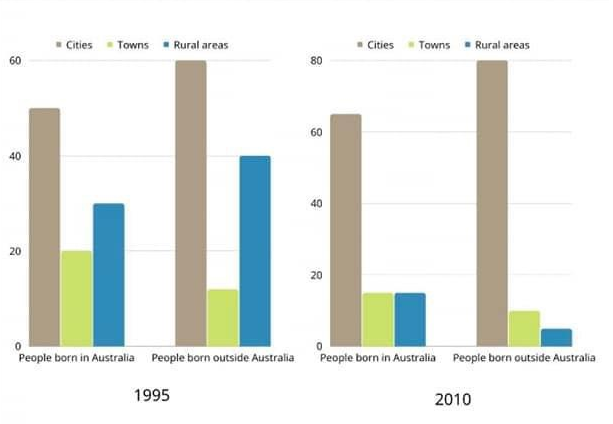[Vân Anh T] Writing Practice Test 1014077
Task 1
You should spend about 20 minutes on this task.
The bar chart below describes some changes about the percentage of people were born in Australia and who were born outside Australia living in urban, rural and town between 1995 and 2010.
Summarise the information by selecting and reporting the main features and make comparisons where relevant.
You should write at least 150 words.

The graph provides data about the number of Australia-born individuals and Non-Australians living in three different places during 1995 and 2010.
Overall, the vast majority of the two groups chose to live in the cities between the two years. Furthermore, the percentages of both groups living in the city increased over the period.
For those born in Australia, in 1995, the protion of people living in cities was about 50%, while people living in towns and rural areas accounted for 20% and nearly 30% respectively. In 2010, people living in cities exceeded to more than 60% while the other two features were the same.
On the other hand, people who were born elsewhere living in cities stood at 60% in 1995 and 80% in 2010. The percentage of non-Australians living in rural areas declined significantly from 40% in 1995 to nearly 5% in 2010.
Task 2
You should spend about 40 minutes on this task.
Rich countries often give money to poorer countries, but it does not solve poverty. Therefore, developed countries should give other types of help to the poor countries rather than financial aid. To what extent do you agree or disagree?
You should write at least 250 words.
Nowadays, many developed countries around the world prefer to give financial aids to poorer countries with a view to providing the disadvantaged people with a better quality of life. However, this action has not been effective as considered. I totally agree with the suggestion that rich countries should change their ways to other forms of help.
Firstly, in order to deccrease the poverty in the long run, the citizens of non-developed and developing countries should be provided with good quality education. Since education is the key to widen people's knowlege and behavior, the government in poor countries should help their citizens to go to school and absorb knowledge. Developed countries can share their experience in education such as taking theories into practice, or creating more chances for students in poorer countries to study abroad. Moreover, they can help improving the poor's economy by sponsoring modern equipments for agricultural and industrial fields.
Secondly, the world's economy is now improving with the progress of advanced technology. Rather than giving money to poorer countries, the developed ones should provide them the others with better access to technology and equipment. By supplying medical vaccines or life-saving medicines, the citizen's health can be enhanced. Furthermore, with the help of modernized machinery in industry, poor countries may know how to expoit natural resources that they have. Since natural resources such as fossil fuels, minerals or mentals are precious, the modern machinery can help poor countries to take advantage of their resources and enhance their own economies.
In conclusion, giving financial aids only benefit in short term while better education and better technology can benefit in the long run.
Community’s feedback
Sorry! We couldn't find any contents.
Leaderboard:
| # | User | Score | Time | |
|---|---|---|---|---|
| Kento Nanami |  | 8.5 | 52:31 | |
| Nayef Alhajraf |  | 8.5 | 60:00 | |
| Ella Ruppo |  | 7.5 | 59:39 | |
| 4 | chengxi yu |  | 7.0 | 00:00 |
| 5 | avin chui |  | 7.0 | 59:11 |
| 6 | 癫 火 |  | 7.0 | 59:51 |
| 7 | Li Xuefeng |  | 6.5 | 03:46 |
| 8 | Chanisara Wongkongsang |  | 6.5 | 56:37 |
| 9 | Dan H |  | 6.0 | 50:41 |
| 10 | Carlo Di Giacomo |  | 6.0 | 60:00 |



